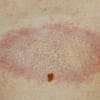
Have you found discolored, hardened or purple-reddish patches on your skin? Reach out to the team at Bay Dermatology as you may be faced with a rare skin condition called Morphea. Also known as localized scleroderma, this condition may appear on your face, feet, back, chest, hands and neck. Luckily this rare skin condition is not contagious. It is usually painless and will only become problematic when it forms on sensitive areas such as the joints and face.
There are a few forms of morphea to look out for, these can all be diagnosed with a simple physical exam or skin biopsy at our office. Plaque morphea is the most common form of this skin condition and appears as oval lesions that may become itchy. Generalized plaque morphea can affect deeper tissues and lead to cosmetic disfigurement. A person facing this form will typically have more lesions over a larger area of skin.
Pansclerotic morphea starts in children, it will cover almost the entire body and usually requires a more aggressive form of treatment. The last form of this condition is Linear morphea which mostly affects school aged children. This will normally appear on the arms of legs and is a single band of thick discolored skin. These can cross joints and expand to the tissue below the skin which may result in deformities.
What causes Morphea?
Known to be an autoimmune disease the exact cause of this rare skin condition is unclear but is in part due to increased collagen deposition. Some of the believed causes are recurrent trauma to the skin, family history of an autoimmune disease, radiation therapy, skin damage caused from environmental exposure and infections. Some risk factors can be found here.
Morphea Treatment
There is currently no cure but after this skin condition has been detected there are various treatment plans depending on the severity of your form of morphea. These treatments include phototherapy, vitamin D creams, and steroids.
Morphea Facts
- Only affects less than 3 out of 100,000 people
- 3x more common in females
- Usually begins during childhood
- 40% of patients with morphea have a family history of autoimmune diseases
The Experts at Bay Dermatology
Contact the experts at Bay Dermatology. We will work on a treatment plan designed especially for you so you can get your confidence and natural beauty back.
